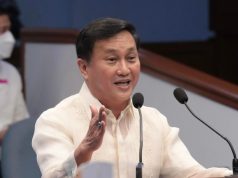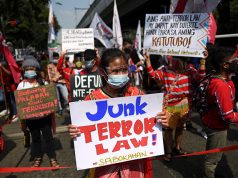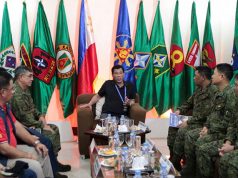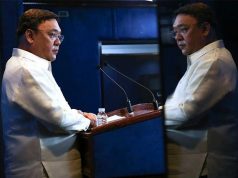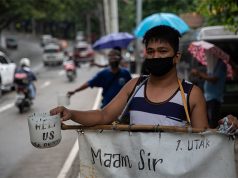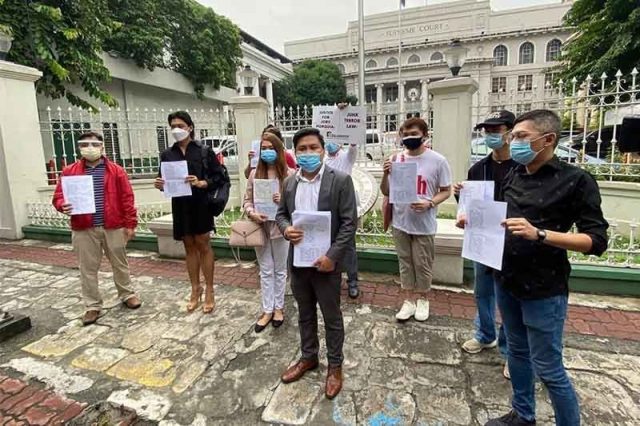
Local influencers and bloggers were the latest petitioners to challenge the controversial Anti-Terrorism Act of 2020 before the Supreme Court.
On Wednesday, a total of 19 internet personalities called the Concerned Online Citizens urged the High Court to scrap several provisions in the new counter-insurgency measure as unconstitutional and void.
The group, represented by San Sebastian College of Law Dean Rodel Taton as their legal counsel, also asked the high tribunal to conduct oral arguments on the petition, which was the 21st plea filed since the law’s passage last July 3.
These petitioners with hundreds to thousands of followers on social media platforms are:
- Mark Averilla or Macoy Dubs
- Community manager Noelle Theresa Capili
- Award-winning artist, illustrator and author Robby “Rob” Derrick Cham
- Engineer and activist Victor Louis Crisostomo
- Blogger and columnist Anthony Ian Cruz or Tonyo Cruz
- Marita Dinglasan or Aling Marie
- Writer and LGBT advocate Thyssen or Thysz Estrada
- Mark Angelo Geronimo or Twitter bhie bhie gurl
- Cebu tourism advocate Balbino Pada Guerrero Jr. or Ka Bino Guerrero
- Jover Laurio of Pinoy Ako Blog
- Agrarian reform campaigner John Carlo Mercado or JC Mercado
- Blogger-turned-lawmaker Raymond De Vera Palatino
- Lean Redino Porquia of Reklamador Facebook page
- Wrier and editor Marcel Dar Stefan Punongbayan
- Artist and college student Albert Louis Raqueño
- Mindanao blogging community pioneer Oliver Richard Robillo
- Blogger advocate Julius or Jhay Rocas
- Spoken word artist Juan Miguel Severo
- Mental health champion Ma. Gia Grace Sison
Through hashtags #SuetheTurtle and #RampaSaKorteSuprema, a number of them shared photos and videos taken during the filing of the petition.
Okay wait lang. #SueTheTurtle pic.twitter.com/GTPerHaJAr
— Macoy Dubs (@macoydubs1) July 29, 2020
mangalampag tayo!!! (at mag-tiptoe hahaha)
the law should make us feel protected, not vulnerable. hindi tayo papayag na gamitin ang ATA para matahimik tayo dahil may karapatan tayo, offline AND online. #RampaSaKorteSuprema#SueTheTurtle#COCBlockAntiTerrorLaw#JunkTerrorLaw pic.twitter.com/vjUpr5R0Ox
— Albert Raqueño (@albertraqueno) July 29, 2020
We went to court today: With @mongster @macoydubs1 (in heels) @victoryliner @leanporquia @markgeronimo_ @albertraqueno and our lawyer Rodel Taton. #RampaSaKorteSuprema #SueTheTurtle#COCBlockAntiTerrorLaw pic.twitter.com/ihRZdetLPQ
— Tonyo Cruz (@tonyocruz) July 29, 2020
The former hashtag was similar to the previous hashtag #OustTheTurtle used to counter calls to oust Sen. Kiko Pangilinan.
Critics of the Duterte administration used the it as a substitute to the #OustDuterte online campaign that suddenly gained global traction following President Rodrigo Duterte’s shoot-to-kill remarks against quarantine violators last April.
Creative director Estrada, one of the petitioners, also shared a screenshot of the appeal on her account.
“Kung hindi tayo ngayon magsasalita, kailan pa?” Estrada said.
Together with other Concerned Online Citizens (COC), we filed the 21st petition against the Anti Terror Law.
Kung hindi tayo ngayon magsasalita, kailan pa? Maingay na tayo sa social media, panahon nang dalhin na natin ang #RampaSaKorteSuprema! #COCBlockAntiTerrorLaw!!! pic.twitter.com/GAGnon6sj3
— Panlasang Pinay (@thysz) July 29, 2020
Mercado, who goes by @darnitJC, on Twitter also shared an artwork showcasing their “Rampa sa Korte Suprema” initiative.
“Exhaust all the means. Labanan ang terorismo ni Duterte!” he said.
We just filed a petition against Anti-Terror Law on the grounds of infringing online and offline freedom of expression.
EXHAUST ALL THE MEANS.
LABANAN ANG TERORISMO NI DUTERTE!#SueTheTurtle#RampaSaKorteSuprema pic.twitter.com/DqOZ2oDBrr
— JC #OustDuterteNow ✨🙃✊ (@darnitJC) July 29, 2020
Bad track record in labeling terrorists
The group argued that given their vocal commentaries on social media, they could easily be labeled as “terrorists,” “terrorist sympathizers” or “terrorist enablers” with the law in full effect.
They also recalled the instances that Duterte labeled critics as “enemies of the state” and “destabilizers” which consequently put their safety at risk.
“Petitioners can be designated as ‘terrorists’ or ‘terrorist sympathizers’ or ‘terrorist enablers’ are apparent. There is a credible threat of prosecution, it is real,” the petition read.
“The official spokespersons for the government and the President himself have labeled critics as enemies of the state and in a matrix or in televised speeches called them out as terrorists or destabilizers,” it added.
In the plea, the petitioners also cited recent cases wherein there are “arbitrary” applications of laws to individuals who are only exercising their constitutional right to free expression online.
These include the Filipino migrant worker in Taiwan whom a labor attache sought to deport, the arrest and detention of the public school teacher in Olongapo, and the arrest of Cebu artist Maria Victoria Beltran.
Due to the nature of their online content, the influencers also raised the concern on the possibility of being “tracked down, followed, or investigated or having their messages, conversations, discussions, spoken or written words tapped, listened, intercepted and recorded through various means, including computer and network surveillance.”
“The Anti-Terrorism Act presents a clear threat on the free exercise by the citizens-netizens of their fundamental right to speak on issues of national importance, albeit online,” they said.




